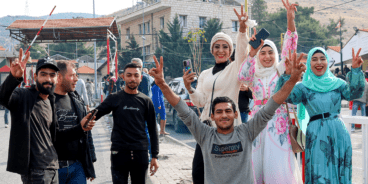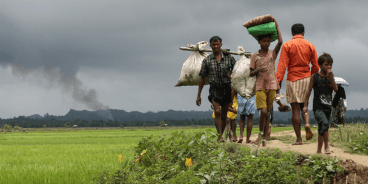
Atrocity Alert No. 82: Syria and the Islamic State of Iraq and the Levant
Atrocity Alert is a weekly publication by the Global Centre for the Responsibility to Protect highlighting situations where populations are at risk of, or are enduring, mass atrocity crimes.
400,000 People Face Bombing and Starvation in Besieged Eastern Ghouta
According to the United Nations up to 400,000 people remain trapped in eastern Ghouta, near Damascus, in an area which has been besieged by Syrian government forces for over four years. Despite being designated one of four “de-escalation zones” earlier this year by Russia, Iran, Turkey and the Syrian government, more than 40 civilians were killed within eastern Ghouta between 26-27 November as a result of government airstrikes and shelling by armed opposition groups.
Ongoing attacks on civilian infrastructure in eastern Ghouta have destroyed water supplies and medical facilities, while a growing number of civilians – especially children – are facing starvation or death from preventable diseases. Today, 29 November, UNICEF reported that 11.9 percent of children under five years of age in eastern Ghouta are acutely malnourished – the highest rate recorded in Syria since the start of the civil war. The UN estimates that only about ten percent of the besieged population has been reached by recent emergency food supplies.
The events in eastern Ghouta are occurring one year after the besiegement and final assault on the opposition-held area of Aleppo, Syria’s largest city. The fall of eastern Aleppo in December 2016 resulted in countless deaths and the displacement of tens of thousands of civilians. Shortly afterwards, in his final press conference as UN Secretary-General, Ban Ki-moon described Aleppo as being “a synonym for hell” and Syria as “a gaping hole in the global conscience.”
Although the eighth round of UN-led talks began in Geneva yesterday, 28 November, hope for a negotiated solution to the Syrian civil war remains negligible. Consequently, atrocities continue to be perpetrated by all sides of the conflict and the intolerable suffering of Syrian civilians in eastern Ghouta and elsewhere continues.
Despite Russia being a key ally of the Syrian government, the UN Security Council should demand UN access to monitor so-called “de-escalation zones” and facilitate the safe delivery of vital humanitarian assistance to the starving population of eastern Ghouta. Meanwhile, all UN member states should fully cooperate with the UN’s International, Impartial and Independent Mechanism to assist in the investigation and prosecution of all perpetrators of atrocities in Syria, including non-state armed groups and those responsible for deliberately bombing, besieging and starving civilians.
The “Islamic State” is No More, but ISIL Still Threatens Religious Minorities
In recent months the so-called Islamic State of Iraq and the Levant (ISIL, ISIS or Da’esh) have suffered devastating military defeats across Iraq and Syria, resulting in the loss of 95 percent of the territory the extremist armed group once occupied. At its peak ISIL controlled major Iraqi and Syrian cities and ruled over an estimated eight million people. Despite the fact that ISIL no longer holds any significant territory, it continues to pose a threat to vulnerable ethnic and religious minorities.
ISIL’s followers remain committed to the extermination of all religious communities and minority cultures that do not conform to its distorted interpretation of Islam. In Iraq and Syria, for example, an estimated 3,300 members of the Yazidi community remain in ISIL captivity or are still missing, including over 1,500 women and girls. Since June 2014 at least 94 mass graves have been discovered across Iraq which are thought to contain the bodies of ISIL’s victims.
Beyond Iraq and Syria, ISIL and its affiliates pose a growing threat to other minority communities. On 24 November armed militants stormed al-Rawdah Sufi mosque near Bin al Abed in Egypt’s Sinai peninsula, killing over 300 worshippers, including 27 children. This was the deadliest terrorist attack in Egypt’s history, and although no group has officially claimed responsibility, reports indicate that some of the attackers were carrying ISIL flags.
Similar attacks on mosques across Afghanistan by ISIL-Khorasan (ISIL-K) have also led to the deaths of scores of worshippers. A report released by the UN Assistance Mission in Afghanistan earlier this month documented a significant increase in attacks on places of worship. At least 145 people have been killed so far this year in sectarian attacks on Shia mosques and religious events by ISIL-K and other armed extremist groups.
Although ISIL’s tactics are shifting, its goal remains the same. Since 2014 ISIL has perpetrated war crimes, crimes against humanity and genocide against various religious and ethnic minorities. The victims and survivors of ISIL’s atrocities deserve justice and the support of the entire international community. On 21 September the UN Security Council passed Resolution 2397 establishing an Investigative Team to support the local authorities in their efforts to prosecute ISIL members responsible for atrocities in Iraq. All states facing the threat of ISIL’s terrorism and sectarian violence should enhance domestic efforts to hold perpetrators accountable, while promoting programs to counter violent extremism and protect the human rights of all their populations, regardless of religion or ethnicity.
Related Publications


Statement on the developing situation in Syria
